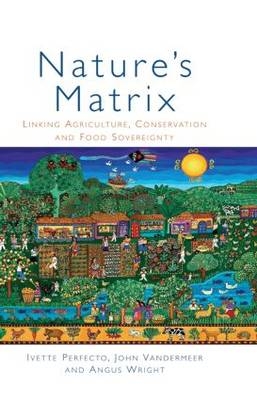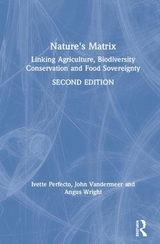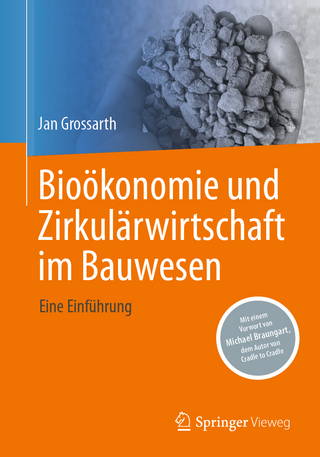
Nature's Matrix
Linking Agriculture, Conservation and Food Sovereignty
Seiten
2009
Earthscan Ltd (Verlag)
978-1-84407-781-6 (ISBN)
Earthscan Ltd (Verlag)
978-1-84407-781-6 (ISBN)
- Titel erscheint in neuer Auflage
- Artikel merken
Zu diesem Artikel existiert eine Nachauflage
Landscapes are frequently seen as fragments of natural habitat surrounded by a 'sea' of agriculture. This work proposes a fresh approach to the conservation of biodiversity based on advances in the science of ecology and political realities, particularly in the world's tropical regions.
Landscapes are frequently seen as fragments of natural habitat surrounded by a 'sea' of agriculture. But recent ecological theory shows that the nature of these fragments is not nearly as important for conservation as is the nature of the matrix of agriculture that surrounds them. Local extinctions from conservation fragments are inevitable and must be balanced by migrations if massive extinction is to be avoided. High migration rates only occur in what the authors refer to as 'high quality' matrices, which are created by alternative agroecological techniques, as opposed to the industrial monocultural model of agriculture. The authors argue that the only way to promote such high quality matrices is to work with rural social movements. Their ideas are at odds with the major trends of some of the large conservation organizations that emphasize targeted land purchases of protected areas. They argue that recent advances in ecological research make such a general approach anachronistic and call, rather, for solidarity with the small farmers around the world who are currently struggling to attain food sovereignty.
Nature's Matrix proposes a radically new approach to the conservation of biodiversity based on recent advances in the science of ecology plus political realities, particularly in the world's tropical regions.
Landscapes are frequently seen as fragments of natural habitat surrounded by a 'sea' of agriculture. But recent ecological theory shows that the nature of these fragments is not nearly as important for conservation as is the nature of the matrix of agriculture that surrounds them. Local extinctions from conservation fragments are inevitable and must be balanced by migrations if massive extinction is to be avoided. High migration rates only occur in what the authors refer to as 'high quality' matrices, which are created by alternative agroecological techniques, as opposed to the industrial monocultural model of agriculture. The authors argue that the only way to promote such high quality matrices is to work with rural social movements. Their ideas are at odds with the major trends of some of the large conservation organizations that emphasize targeted land purchases of protected areas. They argue that recent advances in ecological research make such a general approach anachronistic and call, rather, for solidarity with the small farmers around the world who are currently struggling to attain food sovereignty.
Nature's Matrix proposes a radically new approach to the conservation of biodiversity based on recent advances in the science of ecology plus political realities, particularly in the world's tropical regions.
Ivette Perfecto is Professor of Natural Resources at the University of Michigan. John Vandermeer is Asa Gray University Professor in the Department of Ecology and Evolutionary Biology, University of Michigan. Angus Wright is Emeritus Professor of Environmental Studies at California State University Sacramento.
1. Matrix Matters: An Overview
2. The Ecological Argument
3. The Agricultural Matrix
4. The Broad Social Context for Understanding Biodiversity, Conservation and Agriculture
5. Coffee, Cacao and Food Crops: Case Studies of Agriculture and Biodiversity
6. The New Paradigm
References
Index
| Erscheint lt. Verlag | 18.9.2009 |
|---|---|
| Verlagsort | London |
| Sprache | englisch |
| Maße | 156 x 234 mm |
| Gewicht | 550 g |
| Themenwelt | Naturwissenschaften ► Biologie ► Ökologie / Naturschutz |
| Sozialwissenschaften ► Soziologie ► Spezielle Soziologien | |
| Technik ► Umwelttechnik / Biotechnologie | |
| Weitere Fachgebiete ► Land- / Forstwirtschaft / Fischerei | |
| ISBN-10 | 1-84407-781-0 / 1844077810 |
| ISBN-13 | 978-1-84407-781-6 / 9781844077816 |
| Zustand | Neuware |
| Haben Sie eine Frage zum Produkt? |
Mehr entdecken
aus dem Bereich
aus dem Bereich
Buch | Softcover (2024)
Springer Vieweg (Verlag)
49,99 €



